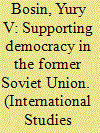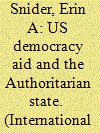| Srl | Item |
| 1 |
ID:
117529


|
|
|
|
|
| Publication |
2012.
|
| Summary/Abstract |
Recent studies find that US democracy assistance has helped build new democratic regimes across the globe. Nearly two decades of democracy assistance in the former Soviet Union (FSU), however, appear to have had a negligible impact on democracy in the region. This research uses a time-series cross-sectional statistical analysis to establish that US democracy assistance efforts in the FSU have failed to enhance democracy in the region. The incentives that FSU leaders had to misrepresent their commitment to democracy and the United States' understandable misperception of these leaders' actions help to explain this failure.
|
|
|
|
|
|
|
|
|
|
|
|
|
|
|
|
| 2 |
ID:
165519


|
|
|
|
|
| Summary/Abstract |
How does learning about democratic erosion in other countries shape opinions about the state of democracy in the United States today? We describe lessons learned from a collaborative course on democratic erosion taught at nearly two dozen universities during the 2017–18 academic year. We use survey data, student-written blog posts, exit questionnaires, and interviews with students who did and did not take the course to explore the effects of studying democratic erosion from a comparative perspective. Do comparisons foster optimism about the relative resilience of American democracy or pessimism about its vulnerability to the same risk factors that have damaged other democracies around the world? Somewhat to our surprise, we find that the course increased optimism about US democracy, instilling greater confidence in the relative strength and longevity of American democratic norms and institutions. We also find, however, that the course did not increase civic engagement and, if anything, appears to have exacerbated skepticism toward activities such as protest. Students who took the course became increasingly sensitive to the possibility that some forms of civic engagement reflect and intensify the same threats to democracy that the course emphasized—especially polarization.
|
|
|
|
|
|
|
|
|
|
|
|
|
|
|
|
| 3 |
ID:
163276


|
|
|
|
|
| Summary/Abstract |
A recent study commissioned by the United States Agency for International Development to assess the effectiveness of its spending on democracy in its programs worldwide found that such aid works—with the sole exception of programs in the Middle East. What explains this exception? I argue that previous studies on democracy aid pay insufficient attention to the fact that such programs often develop as negotiated deals. Because authoritarian regimes may choose how to accept assistance, democracy aid may reward economic interests tied to incumbent regimes. I explore these dynamics through case studies of US democracy programming in Egypt and Morocco
|
|
|
|
|
|
|
|
|
|
|
|
|
|
|
|